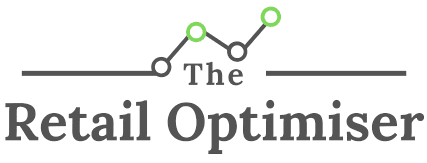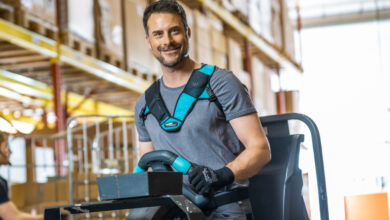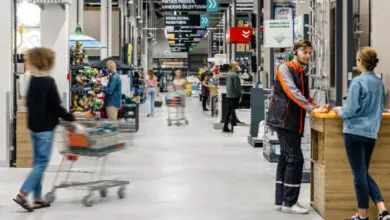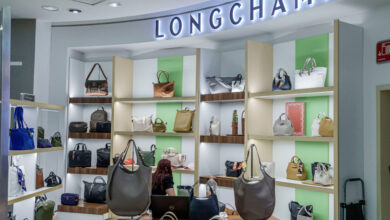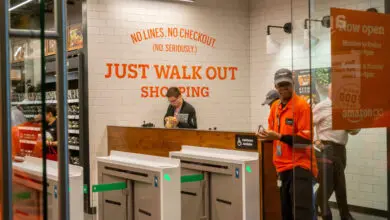Reta 2022: Edeka’s Netto wins twice with Trigo and Tiliter
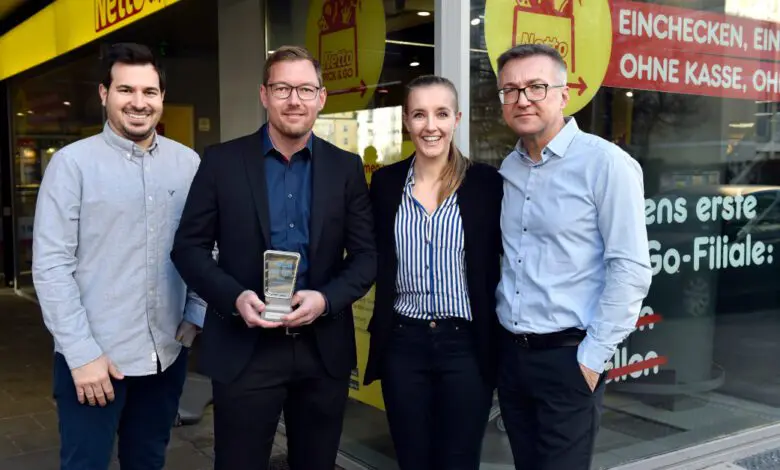
Edeka’s Netto Marken-Discount was able to secure two prizes at EHI’s Reta Awards 2022, the winners of which were announced today. The teams around Netto CIO Claus Leitl won firstly with their Pick&Go store in Munich’s Schwabing district. They won a second prize together with Tiliter for the automatic recognition of products without barcodes such as fruit and vegetables.
With the Israeli specialists from Trigo Vision, Netto was the first German discounter to succeed in offering customers in one store shopping without scanning at all (The Retail Optimiser reported). Pick&Go users neither have to go to a checkout or payment terminal, the amount is charged to them via the app. Unlike other retail groups, the discounter of Edeka Group managed to put Trigo’s system into operation in a store where people can continue to shop as usual — they can optionally go to the conventional checkout without an app.
Edeka’s Netto is also one of the first banner operations in the German retail sector to use Tiliter to recognise goods sold without barcodes. What is special about this project is that Netto has not only equipped self-checkout and self-service trolleys with Tiliter, but has also significantly increased the speed at the conventional checkout. For this project, Netto won a Reta Award in the category Best AI & Robotics Application.
The Reta Award, organised by Cologne-based EHI Retail Institute, is one of the most important awards in the retail technology sector worldwide. The question of which of the numerous applications are the best retail technology projects is decided by an eight-member jury, which two authors of the Retail Optimiser, Joachim Pinhammer and Björn Weber, are part of.
The other winners of the Reta 2022 are:
- Valora with their Back-Factory banner together with Smoothr/Walkout Technologies and Dutch shopfitting and kiosk terminal specialists Pan Oston, have created a self-checkout that can recognise AI-driven up to ten products within one second — without having to scan them one after the other. The Retail Optimiser reported.
- Lekkerland has developed together with Latebird Germany, a fully automated shop solution that provides a wide range of products around the clock, seven days a week: from chilled products such as salads and sandwiches to non-chilled items such as confectionery and snacks to frozen goods.
- With Warrify, the furniture store operator Porta has declared war on the paper economy by digitising paper receipts, thus saving resources, tapping into customer data and analysing purchasing behaviour. Customers conveniently receive the receipt at the checkout via QR code on their smartphone.
- Coca-Cola developed a concept with partner T-Systems International to solve technical problems in the highly complex bottling plants more efficiently with the help of 3D instructions, mixed reality glasses and software solutions. Holograms, superimposed texts and videos make two-dimensional instructions superfluous. Employees can be instructed on site via the mixed reality glasses without the need for specialist personnel to travel to the site.
- In the course of digitalisation, Markant relies on a digital transaction file for the supply chain. The goal is to provide all parties involved with real-time access to all relevant information related to the supply of the retail warehouses. The focus here is particularly on claw management. The digitisation of delivery notes is supported by state-of-the-art API libraries and existing EDI connections. The process costs for handling complaints in the warehouses could thus be reduced by 70 percent.
- Swiss Migros has simplified and automated processes across companies by setting up a logistics data marketplace in cooperation with GS1 Switzerland, Quibiq Switzerland and smartive AG. This increases transparency about the flow of goods.
- The Austrian Rewe subsidiary Billa has optimised the checkout process with the partners Unser Ö-Bonus Club and Bluecode as well as the software jö&GO! Customers identify themselves at the beginning of the checkout process with a scan from the jö app. At the same time, the 2-in-1 code provides the payment information. At the end of the checkout process, the payment is only agreed verbally with the customers. Analyses show reduced time compared to conventional payment methods.
- Israeli supermarket chain Shufersal uses Shopic’s trolley-mounted devices to automatically detect goods being added or removed. Retail Optimiser reported on Aldi Süd’s tests with Shopic.
- H&M, together with Diebold Nixdorf, BT Group and Shouqianba, has built a new concept for the Scan&Go Customer Journey in the Chinese market, combining shopping and checkout. The CRM system for customer identification, the online shop and the payment solution were linked together. The entire shopping process can be completed via the smartphone.
- The community of Spar companies has introduced Too Good To Go (TGTG), a system to combat food waste. It offers customers of Spar companies a digital solution to reduce food waste in Spar stores. TGTG connects users of its app with grocery shops that have unsold food with a short shelf life at the end of the day. This allows retailers to reduce their food waste. The Retail Optimiser reported.
- British fashion brand Ted Baker has realised real-time visibility of stock across the business with OneStock. Orders are intelligently orchestrated to optimise availability in shops. The system uses algorithms to search inventory in real time across on-site warehouses and shops. This enables the company to make an improved delivery promise.
- Together with Consenso Consulting, Edeka Rhein-Ruhr has introduced intelligent process flows to increase the speed of rollouts. These processes are used fully automatically in different scenarios but can also be controlled by a rollout team. The solution allows input data for the processes to be organised independently, thus achieving maximum flexibility.
- With the CI Factory, Engelbert Strauss produces workwear in its corporate design. The CI Factory stands for customised shoe manufacturing in combination with a robot-supported corporate fashion retail platform. In the CI Factory, customers configure their customised workwear and safety footwear individually and can choose from 40,000 products. The project in cooperation with TGW Systems Integration was completely built with a digital twin in advance.
